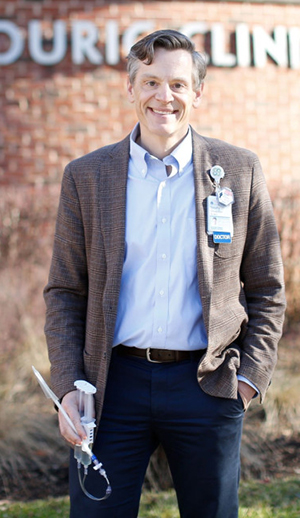

Class Year
2004
Affiliation
Alumni
Posted on: January 18, 2024
Timothy N. Showalter, MD ’04, has been selected as the 2023 Edlich-Henderson Innovator of the Year by the University of Virginia. The endowed award recognizes University inventors whose work is making a major impact on society.
Showalter, a UVA School of Medicine professor and clinician at the UVA Cancer Center, invented a product for women with cervical cancer called the BrachyGel Vaginal Hydrogel Packing System that received U.S. Food & Drug Administration clearance last year as the first product of its class. It replaces gauze during radiation therapy, reducing patient discomfort during treatment procedures.
“I’m delighted that Dr. Showalter was named as the Edlich-Henderson Innovator of the Year,” UVA President Jim Ryan said. “Dr. Showalter’s research, and his ability to turn that research into a product available to patients nationwide, is helping women with cervical cancer and their families during a very difficult time.”
Showalter recently sold his startup company, Advaray – which was founded to develop his product, BrachyGel – to CQ Medical, a global leader in healthcare innovations.
“It’s not too often that an innovator can be the lead inventor and the co-founder of a company – leading the company to get FDA approval and then leading the acquisition of the company,” UVA Licensing & Ventures Group Executive Director Richard W. Chylla said. “The fact that Tim was able to do all of this is truly remarkable.
“Most important is that Tim’s invention is helping women with cervical cancer. This goes hand in hand with the mission we have here at LVG of improving lives.”
UVA Chair and Professor of Radiation Oncology Dr. James Larner has known Showalter since he was a third-year UVA medical student. He believes Showalter’s multifaceted approach is what sets him apart.
“Tim is not only creative, but he executes flawlessly,” Larner said. “He entered from the idea stage to FDA approval in record time.”
The most gratifying moments for Showalter occurred during the UVA Health clinical trial when women volunteered that they preferred BrachyGel to gauze, the previous standard for care.
“My motivation in developing BrachyGel was to do what I could to make the experience more comfortable for patients and to simplify the procedure for physicians,” Showalter said. “For an emotionally painful and anxiety-inducing procedure, improving one step of it represents forward progress.”
Showalter said he expects BrachyGel to be used in 50 hospitals in the United States by the end of the year and to gain international distribution soon after.
The initial funding for Showalter’s prototypes came from the Ivy Foundation, which supports biomedical innovation and translation research at the University. The polymer chemistry components of the invention were led by Dr. Timothy Long while he was faculty at Virginia Tech.
“The really cool thing is that most of this happened at UVA with contributions from many around Grounds,” said Showalter, a Richmond native who now lives in Charlottesville with his wife, Shayna, and their three children. “We performed early research in the cadaver lab and research imaging facilities at UVA. The clinical trial was designed by UVA biostatistician Gina Petroni, led by my radiation oncology colleague Dr. Kara Romano and administered by our clinical research staff. Federal and state grant funding provided significant research support to UVA. Having this all happening in and around the University made it more rewarding.”